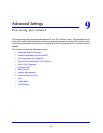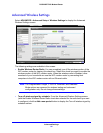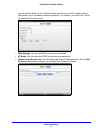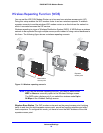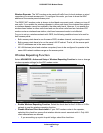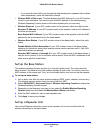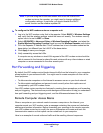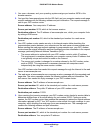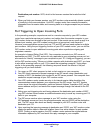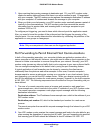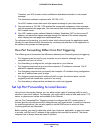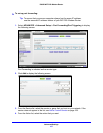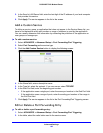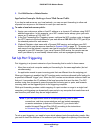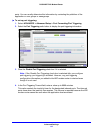
Advanced Settings
103
D6300 WiFi DSL Modem Router
1. You open a browser, and your operating system assigns port number 5678 to this
browser session.
2. You type http://www.example.com into the URL field, and your computer creates a web page
request message with the following address and port information. The request message is
sent to your WiFi modem router.
Source address. Your computer’s IP address.
Source port number. 5678, which is the browser session.
Destination address. The IP address of www.example.com, which your computer finds
by asking a DNS server.
Destination port number. 80, which is the standard port number for a web server
process.
3. Your WiFi modem router creates an entry in its internal session table describing this
communication session between your computer and the web server at www.example.com.
Before sending the web page request message to www.example.com, your WiFi modem
router stores the original information and then modifies the source information in the request
message, performing Network Address Translation (NAT):
• The source address is replaced with your WiFi modem router’s public IP address.
This requirement is necessary because your computer uses a private IP address that
is not globally unique and cannot be used on the Internet.
• The source port number is changed to a number chosen by the WiFi modem router,
such as 33333. This requirement is necessary because two computers could
independently be using the same session number.
Your WiFi modem router then sends this request message through the Internet to the web
server at www.example.com.
4. The web server at www.example.com composes a return message with the requested web
page data. The return message contains the following address and port information. The
web server then sends this reply message to your WiFi modem router.
Source address. The IP address of www.example.com.
Source port number. 80, which is the standard port number for a web server process.
Destination address. The public IP address of your WiFi modem router.
Destination port number. 33333.
5. Upon receiving the incoming message, your WiFi modem router checks its session table to
determine whether there is an active session for port number 33333. Finding an active
session, the WiFi modem router then modifies the message to restore the original address
information replaced by NAT. Your WiFi modem router sends this reply message to your
computer, which displays the web page from www.example.com. The message now
contains the following address and port information.
Source address. The IP address of www.example.com.
Source port number. 80, which is the standard port number for a web server process.
Destination address. Your computer’s IP address.



